Hisense U8K Mini-LED Google TV review
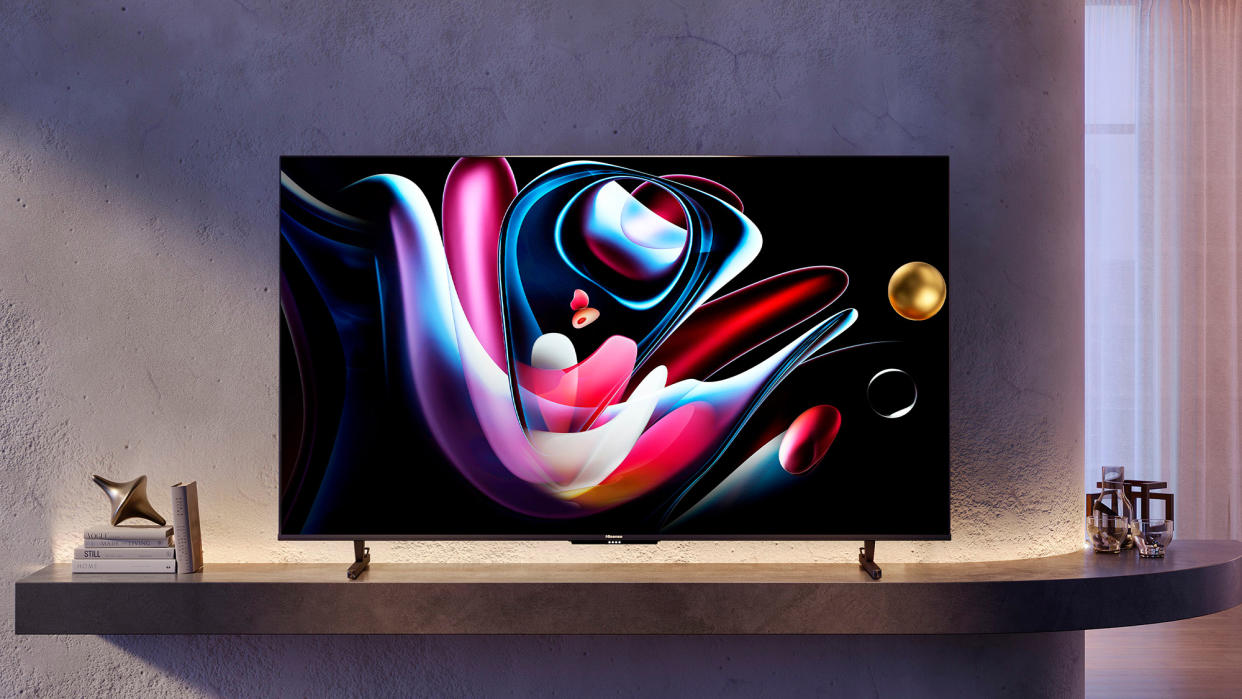
In my mind, there are three types of TVs out there: There are TVs with accurate colors that look great in a fully light-controlled room; there are TVs with flashy colors that look great in a brightly lit room; and there are TVs that look bad in every room.
The Hisense U8K Mini-LED is firmly in the middle camp. Even in a room with lots of ambient lighting, colors with deep hues don’t lose their saturation and the results are truly mesmerizing. It was hard to look away from the screen long enough to write this review.
Key to the U8K’s success are the Mini-LED Pro with Full Array Local Dimming panel that helps the TV retain good black levels in scenes with higher levels of brightness and a quantum dot layer that allows the TV to cover a groundbreaking 80% of the Rec2020 Color Space. It might be a party in the front, but it’s all business in the back of the screen.
Despite these enviable qualities, the Hisense U8K isn’t without its faults. Among the ones we found during our testing period were middling input lag (13.2ms) and slightly long load times when jumping from one streaming app to another. The TV’s color volume is absolutely massive, but its accuracy of 4.46 as measured in our Delta-E test leaves a lot to be desired.
These issues don’t prevent the Hisense U8K from being one of the best TVs on the market — and one I’ll keep coming back to watch — but it does mean that gamers looking for the fastest response times and cinephiles looking for the most accurate colors might want to look at some other options like the LG C3 OLED or Samsung S95C OLED instead.
Hisense U8K Mini-LED TV review: News and updates
The Hisense U8K is due for an update in 2024. At CES 2024, Hisense announced the new U8N model that will include ATSC 3.0, WiFi 6e, 144Hz refresh rate, and 3,000 nits of peak brightness. The U8N will use the company's new Hi-View Engine Pro processor, which should help speed up navigation and load times of the Google TV smart platform. Want to learn more? Check out our guide to the 2024 Hisense TV lineup.
Hisense U8K Mini-LED TV review: Price and release date
The Hisense U8K Mini-LED TV is part of the Hisense 2023 TV lineup alongside the Hisense U7K and Hisense U6K. The U8K is the flagship model of the lineup, only topped by the Hisense UX that comes solely in a single 85-inch screen size.
The Hisense U8K review unit we tested is the 65-inch configuration, but there’s also a smaller 55-inch version and a larger 75-inch version if the 65-inch screen isn’t right for your room. Not sure which size to buy? Check out our guide on ‘What size TV should you buy?’
55-inch Hisense U8K Mini-LED TV (55U8K): $1,299
65-inch Hisense U8K Mini-LED TV (65U8K): $1,699
75-inch Hisense U8K Mini-LED TV (75U8K): $2,299
As far as the pricing is concerned, the U8K is nearly double the cost of the U8H sold for last year. That said, having reviewed both, I think it’s worth spending more on the U8K as Hisense has made improvements in nearly every possible metric.
Hisense U8K Mini-LED TV review: Design
When it comes to its premium TVs, Hisense’s design is more function than it is form. The U8K, for example, is rather thick for an LED-LCD TV, but that thick chassis plays host to a Mini-LED backlight that’s critical to this TV’s excellent performance.
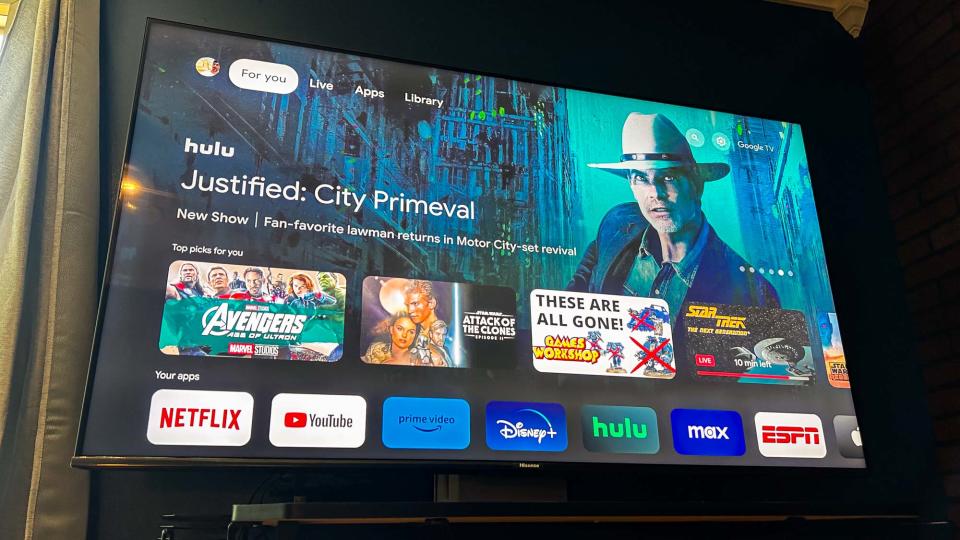
So how heavy is it? At 56.4 pounds this TV is relatively hefty and will require two people to put into place, especially if you plan on wall-mounting. Thankfully, the U8K uses the 400mm x 400mm VESA Wall Mount Standard so you won’t have to struggle too hard to find a mount that will fit the screen.
If you want to place it on a table or entertainment center, like I did for our review, you can use the included metal legs to hold it upright. The U8K allows for two different leg configurations, a wider stance and a narrower one, to accommodate different spaces. If you can, we suggest going for the wider stance for better stability — at nearly 60 pounds you wouldn’t want this TV tipping over — but the narrower stance works fine, too.
Hisense U8K Mini-LED TV review: Ports
Spin the Hisense U8K around to the back and you’ll find four HDMI 2.1 ports, one of which is eARC-compliant, another that’s capable of 4K/144Hz and two more that are HDMI 2.0. In addition to those are two USB ports (one that’s 2.0 and one that’s 3.0), digital optical audio out, an ethernet port and an RF Antenna Input that connects to an ATSC 3.0 tuner.
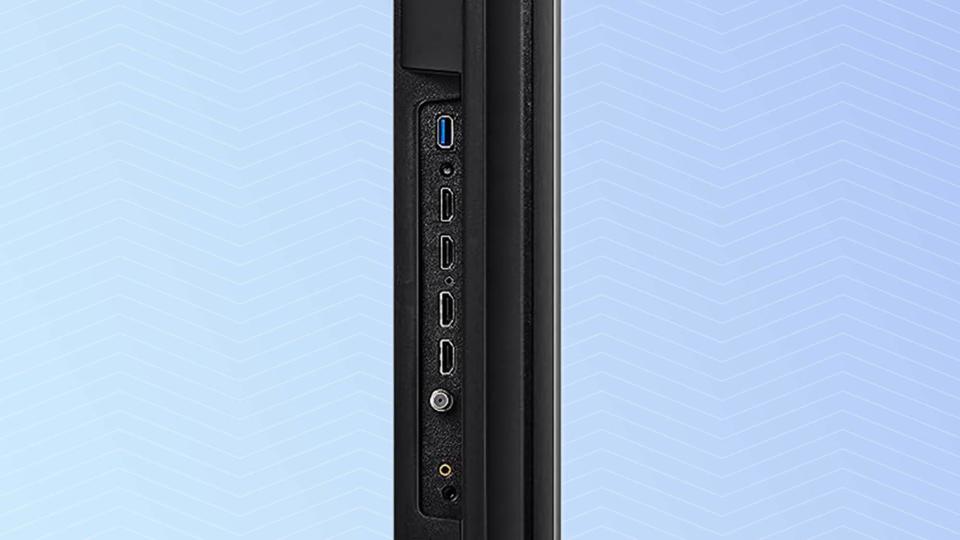
The Hisense U8K doesn’t offer the four full-fat HDMI 2.1 port arrays that some of its competitors offer, but what’s available here should satisfy 99% of the average viewing population.
Hisense U8K Mini-LED TV review: Performance
To put the Hisense U8K through its paces, I threw on a ton of varied content, everything from the David Attenburough-narrated Our Planet II and Dungeons & Dragons: Honor Among Thieves to Zoolander in SDR on Hulu. Everything Was bright, colorful and crisp.
I started off my 4K HDR testing in the same way as I always do — with a nature documentary on Netflix. The Hisense U8K didn’t disappoint. The amber hues of the savannah were vividly portrayed on-screen, while the vibrant emerald-green of the rainforest was genuinely eye-watering. These colors may not have been exactly true to their natural hues (more on this down in our test results section below), but there’s no doubt in my mind that they give off a serious ‘wow’ factor when watching the TV.
Dungeons & Dragons: Honor Among Thieves gave me a chance to test out the TV’s motion handling and black levels. Both were absolutely great after a few tweaks. To get the best motion experience, be sure to turn processing either to ‘off’ or ‘low’ — the latter will ensure no scenes look overly processed, while still getting a few extra frames inserted in the fastest-moving scenes. For the best black levels, change the default picture setting from ‘Energy Saving’ to either ‘Theater Day’ or ‘Filmmaker Mode’ — both are great.
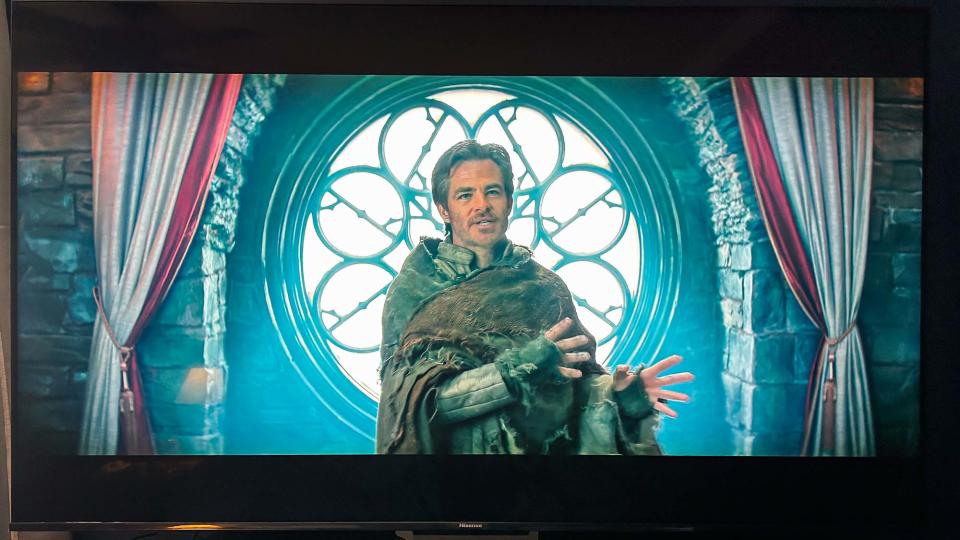
Turning to HD/SDR content, Hisense has taken its upscaling to the next level this year with some SDR films from the early 2000s looking good for their age — even if their content hasn’t aged as well. (Zoolander, I’m looking in your direction.) Films I watched in HD still had some noticeable grain, especially in scenes with both light and dark areas, but any object in the bright areas looked crisp and clear. The upscaling still isn’t on par with what Sony and Samsung are doing with object-based upscaling and foreground-background separation technology, but it’s a noticeable improvement from previous years.
Like HDR shows and movies, HDR gaming looks great on the Hisense U8K and it’s made even better with Hisense’s game bar. The game bar lets you make some tweaks to the settings — like increasing the gamma when games look too dark — and shows you important information like refresh rate. Speaking of, the Hisense U8K supports 144Hz if you connect it to a gaming PC but can otherwise comfortably handle the 4K/120Hz from Xbox Series X and PS5 when they’re plugged into the fourth HDMI port.
The only downside here is that colors will desaturate as you shift off-axis. This is relatively common for Mini-LED TVs so it’s not anything surprising, but it’s an area that companies like Hisense will have to improve upon to keep up with the ever-improving OLED and QD-OLED technology that LG and Samsung are developing.
Hisense U8K Mini-LED TV review: Test Results
To get some quantitative testing data we used an X-Rite i1 Pro spectrophotometer, a SpectraCal VideoForge Pro pattern generator, and Portrait Displays’ Calman calibration software to put the Hisense U8K up against its toughest competitors: the
TCL QM8, LG C3 OLED and Samsung QN90C QLED TV.
Saying that we’re shocked about the Hisense U8K’s test results would be an understatement. This TV goes toe-to-toe with the much more expensive Samsung QN90C and beats it in key categories like SDR brightness and color saturation. This is an almost David and Goliath type of tale with Hisense being the perennial underdog.
The only areas that the Hisense U8K didn’t perform as strongly in were color accuracy (Delta-E) — which it scored the worst of all four TVs we tested — and input latency. The former means that colors, while vibrant, aren’t going to look all that natural. The latter, however, isn’t a huge deal as anything lower than 20 milliseconds is considered nearly imperceptible, but it does mean that serious gamers will be better served with one of the other TVs on that table.
The biggest competition for the Hisense U8K, based on our testing, is the TCL QM8 QLED TV. That screen is currently under evaluation by another one of our staff, and we’ll be sure to publish a full-on versus piece between them once that review is finished.
Hisense U8K Mini-LED TV review: Audio
The Hisense U8K isn’t messing around when it comes to sound quality — it’s equipped with a 2.1.2 speaker system that is plenty powerful for most medium-sized living rooms but a bit lacking in the clarity department.
Dungeons & Dragons: Honor Among Thieves’ soundtrack and audio effects came through crystal clear and filled the room. In its out-of-the-box Standard audio mode, dialogue was a bit harder to hear, but switching over to the Enhanced Dialogue audio mode brought the midrange in line with the powerful upper and lower sonic range.
Dolby Atmos audio tracks played over the Hisense U8K’s speakers did have a small amount of height to them, but it wasn’t close to what you’d hear from a dedicated Dolby Atmos sound system or even one of the best soundbars. We’d still recommend picking up one of those for the best audio experience.
If you can’t afford an upgrade right away, the Hisense U8K’s speaker system will get the job done, but you’ll probably want to upgrade to a soundbar sometime down the line.
Hisense U8K Mini-LED TV review: Interface and apps
There’s a reason that every TV manufacturer is switching to Google TV for its smart platform — it’s slick, it’s simple and it works. It shows you content as soon as it pops on from every video app worth its salt, and its advanced recommendation algorithm only gets better the more you use it. Google TV is, without a doubt, the smart TV platform to beat in 2023.
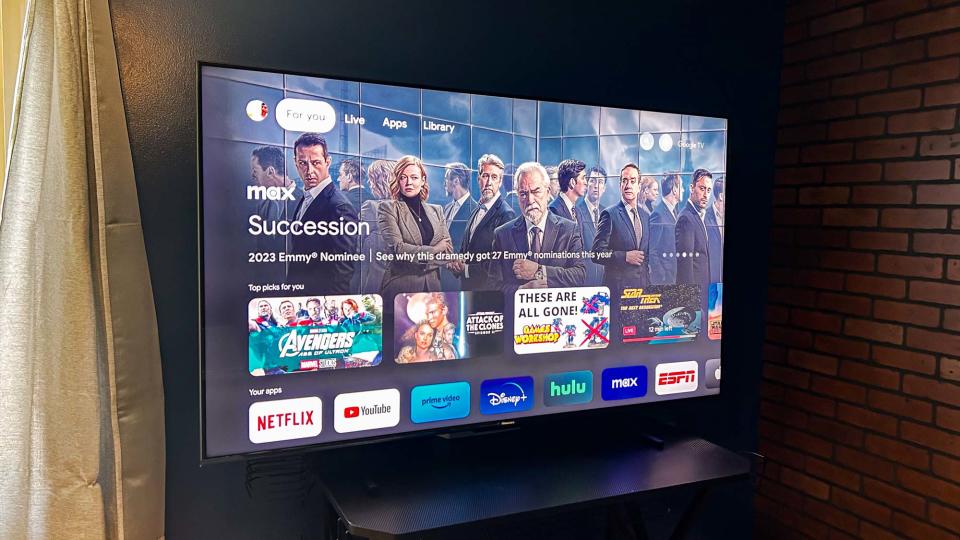
As long as you stick to the home screen, searching for something to watch is an incredibly smooth experience. If you start jumping from one app to another, however, you might see some longer load times. These wait times weren’t enough to ruin our experience, but they do make us a little concerned that they’ll only increase as the TV ages.
As far as app selection goes, Google TV has all the good stuff here and right out of the box Google TV on the Hisense U8K delivers a fantastic experience.
Hisense U8K Mini-LED TV review: Remote
The pack-in remote for the U8K hasn’t changed year over year, but that’s not such a bad thing. While LG includes a Wii-like motion remote with its OLED TVs, the U8K’s remote is a simple Bluetooth voice remote with a built-in microphone and hot buttons to the most popular streaming services. In short, it’s a reliable remote — if not really an innovative one.
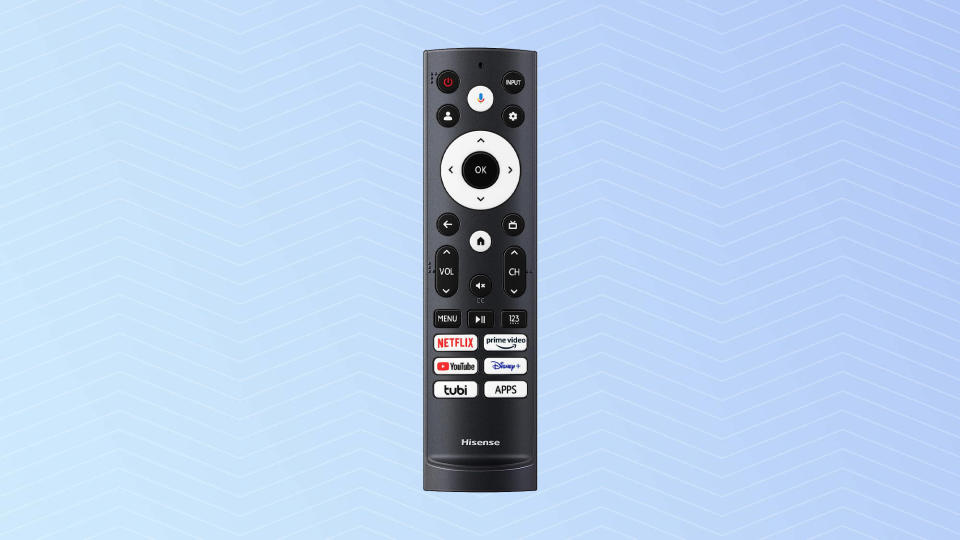
The remote feels nice in the hand, but it would’ve been great if Hisense found a way to include a remote finder feature just in case it gets lost in the couch.
That said, there’s not really as much innovation happening with this Hisense remote as, say, Samsung’s new remotes that can now charge off of both sunlight and RF energy from your Wi-Fi router. The U8K’s remote is basic, but it gets the job done.
Hisense U8K Mini-LED TV review: Verdict
The Hisense U8K is what I would consider a very strong performer for the price. It offers great features and immaculate performance for just over $1,000. This TV will almost certainly appeal to those among us who want to be wowed whenever they turn on a TV. Accurate colors are great, but the U8K’s oversaturated picture is bewitching and difficult to look away from.
Competitors like TCL and Samsung have shown that they can get high brightness from similarly specc’d TVs, but only Hisense has mastered the art of colorful pictures and high brightness at a reasonable price. If you’re looking for a high-end TV without the high-end sticker price, the U8K absolutely delivers the goods.
